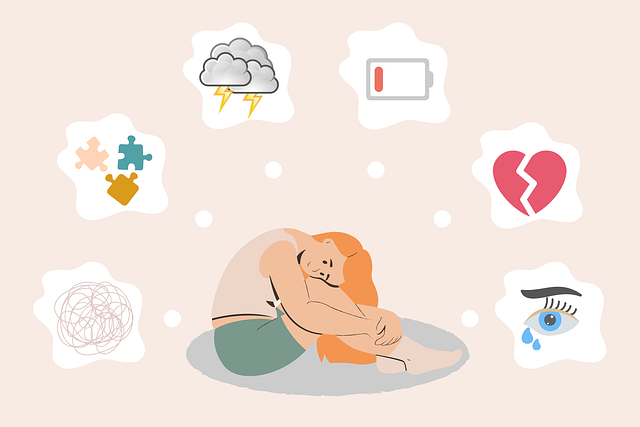Lone Tree Stress Management Therapy offers specialized programs to empower individuals with mental health conditions, such as anxiety and depression, by teaching essential social skills, resilience-building, and crisis intervention strategies. Through holistic approaches like Mind Over Matter principles and Cultural Sensitivity training, clients gain confidence in navigating social situations, improving emotional well-being, and building supportive networks. This tailored therapy transforms stressful encounters into opportunities for growth and fosters meaningful connections, enhancing overall quality of life.
Social skills training is a powerful tool in managing mental health conditions, especially in addressing social anxiety and stress. This comprehensive guide explores how enhancing interpersonal abilities can significantly impact overall well-being. We delve into identifying challenges like social isolation and anxiety, offering practical strategies for effective training. Additionally, we discuss integrating these skills into therapy, providing a roadmap to improved mental health, particularly through Lone Tree Stress Management Therapy techniques.
- Understanding Social Skills and Their Impact on Mental Health
- Identifying Challenges: Lone Tree Stress Management and Social Anxiety
- Strategies for Effective Social Skills Training
- Integrating Training into Therapy: The Journey to Improved Well-being
Understanding Social Skills and Their Impact on Mental Health

Social skills are essential for navigating relationships and connecting with others, playing a significant role in an individual’s mental health and overall well-being. They involve effective communication, empathy, active listening, and appropriate non-verbal cues, enabling people to express themselves, understand others, and build meaningful connections. For individuals dealing with mental health conditions, such as anxiety or depression, social skills training becomes a crucial component of their recovery journey.
At Lone Tree Stress Management Therapy, we recognize that many mental health struggles can isolate folks, making it challenging for them to engage in social interactions. Our specialized programs focus on teaching practical social skills and resilience-building techniques, offering crisis intervention guidance tailored to each client’s unique needs. Through these sessions, individuals learn to manage social situations more effectively, improve their emotional well-being promotion techniques, and build a support system that fosters positive mental health.
Identifying Challenges: Lone Tree Stress Management and Social Anxiety

Many individuals struggling with mental health conditions, such as social anxiety, often face unique challenges in their daily lives. One prominent issue is the feeling of being a “lone tree” among peers, leading to heightened stress and isolation. This sense of detachment can stem from intense self-consciousness, fear of judgment, or difficulties initiating and maintaining conversations.
Social skills training tailored for these specific challenges, like Lone Tree Stress Management Therapy, focuses on empowering individuals to navigate social interactions with confidence. Through various techniques, therapy aids in building resilience against anxiety, improving self-esteem, and fostering meaningful connections. By learning effective communication strategies, individuals can transform their social experiences from stressful encounters to opportunities for growth and support.
Strategies for Effective Social Skills Training

Social Skills Training plays a pivotal role in managing mental health conditions, especially for individuals navigating Lone Tree Stress Management Therapy. Effective strategies for such training go beyond mere communication techniques. It involves teaching clients how to recognize and manage their emotions, fostering empathy towards others, and developing robust coping skills. This holistic approach ensures that individuals not only navigate social interactions with ease but also build resilience against stress and anxiety.
Incorporating Mind Over Matter principles, along with Cultural Sensitivity in Mental Healthcare Practice, enhances the training’s impact. Mindfulness exercises help individuals stay present during conversations, while cultural sensitivity training equips them to understand and appreciate diverse perspectives. These strategies empower clients to engage in meaningful social interactions, improve their overall well-being, and integrate more effectively into various social settings.
Integrating Training into Therapy: The Journey to Improved Well-being

Integrating social skills training into therapy sessions offers a holistic approach to enhancing mental wellness. At Lone Tree Stress Management Therapy, we understand that effective communication and interpersonal interactions play a significant role in one’s overall well-being. By weaving these essential skills into treatment plans, we empower individuals to navigate social situations with confidence, fostering better connections and improving their quality of life.
This journey towards improved mental health involves tailored exercises like journaling prompts designed to encourage self-reflection and positive thinking. Our guidance helps clients unlearn unhealthy patterns and adopt constructive strategies for burnout prevention. Through this process, they gain the tools needed to express emotions, assert boundaries, and build meaningful relationships, ultimately contributing to a more fulfilling life.
Social skills training is a powerful tool in the journey towards improved mental well-being, especially for conditions like social anxiety. By understanding the impact of social interactions on mental health and identifying specific challenges, such as those faced by individuals navigating lone tree stress management, tailored strategies can be developed. Integrating these training methods into therapeutic practices enables people to build confidence and enhance their overall quality of life. This holistic approach, combining therapy with targeted training, offers a promising path forward for managing and overcoming mental health conditions.












